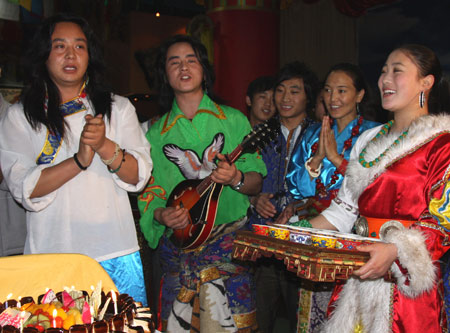Tibetans Celebrate 50th New Year
Adjust font size:
 |
|
Tibetans who live in Shanghai celebrate the upcoming Tibetan New Year with their ethnic costumes and food in Shanghai, on February 23, 2009. The Tibetan New Year falls on February 25 according to the traditional Tibetan calendar. [Xinhua]
|
Tashi arrived in Lhasa two days ahead of the New Year, which starts on February 25 this year, for the annual Lamaism service called Vajra Dance in Tsurpu Monastery.
"I came here on behalf of my whole family with nine family members," Tashi said. He drove a motorcycle for two hours from the grasslands in Damxung, 70 kilometers away from Lhasa.
"My parents told me that I will have a lucky year if I watch the Vajra Dance at the beginning of a year," he said.
Like many others, Tashi consecrated hada, food and 300 yuan (about US$44) of donation in front of the Buddha figures.
His family prepared a whole cattle for the new year banquet. They bought clothes and a cellphone as New Year gifts for Tashi. "I shot pictures of the dance with the cellphone. I will show them to my family," he said.
Before the Vajra Dance, all the lamas of the monastery chanted the sutra for seven days, praying for a favorable year for the people, said the 40-year-old Dradul, head of the monastery.
"From the 81-year-old experienced chanter to the young lamas, all of us have devoted to the chanting," he said.
Local residents around the monastery set fires to drive away evils and they also enjoyed fireworks in the sky.
"I can only feel the real Tibetan new year when I am back in Tibet," said 70-year-old Shago Khamtrul Yeshe Paldan, who returned to China in 1994 after 28 years in Swiss as a "refugee", being a paper maker, electric worker and nurse successively.
This year is an "earth ox" year in the Tibetan calendar, the 15th New Year since he returned home. Except the traditional Tibetan paintings, he also placed bottles of wine in his living room.
On the New Year eve, Tibetans have the tradition to watch a TV gala and eat a special food named Gutu, steamed stuffed bun.
The 74-year-old Tsering Drolma put capsicum, wool and china into the buns, representing spicy personality, mild characteristic and lazy bones respectively for the people who eat it in Tibetan traditions.
Tsering Drolma married a man from southwest China's Chongqing Municipality, who is of the Han ethnic group, in the 1950s. She has a big family with four generations now.
"We celebrate both the Spring Festival and the Tibetan New Year each year," she said.
"We eat Gutu to celebrate the Tibetan New Year together and my son-in-law comes to make jiaozi for us during the Spring Festival."
His son-in-law is also from the Han ethnic group, who celebrate the beginning of the lunar New Year with the Spring Festival.
In other Tibetan residential areas, people also can also find the festive atmosphere for the New Year.
"We have better days and more money now. We now buy more things and more expensive stuff in the new year shopping," said a woman named Kelsang Drolma in her Tibetan clothes among the crowds in a market in Shangri-La County of Deqen Tibetan Autonomous Region, Yunnan Province.
As the Spring Festival and the Tibetan New Year is close to each other, stores had prepared abundant goods for the two, said a salesman in the market.
A New Year party will be on Wednesday in the county and a series of activities will be held from Wednesday to Friday in Deqen County.
The new year is a special year for the quake-affected people, like herdsman Balo who had lost his house in the fatal quake and recently moved to new tents for the new year festival in Ganzi Tibetan Autonomous Region, Sichuan Province.
Bola's family with four members now have a home with facilities like solar energy lighting, beds, cabinets and stoves.
He had prepared for many days to invite his family members and friends to celebrate the new year in his big tent together.
The province has launched a residential project for the herdsmen here before the new year, providing new tents for 100,000 herdsmen households by April 20.
It plans to spend 18 billion yuan (about US$2.6 billion) to improve the living conditions of the herdsmen households in 29 counties in the next four years.
Tibetans also gathered in Beijing, Shanghai and Hebei Province for New Year celebrations.
"Shanghai and Tibet are both my homes," said Yangjen who has lived in Shanghai for more than 30 years and celebrated the Tibetan new years here for years.
"I never felt lonely over these years. Whenever I met any difficulty, people always came to help me. I can feel the deep friendship between Tibetans and the Han people everywhere," she said.
"Cheers for all the Tibetans!" she toasted in a Tibetan restaurant with many other Tibetans during a party held by the local government.
(Xinhua News Agency February 25, 2009)